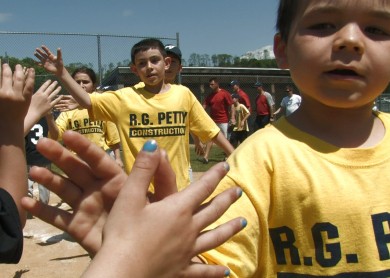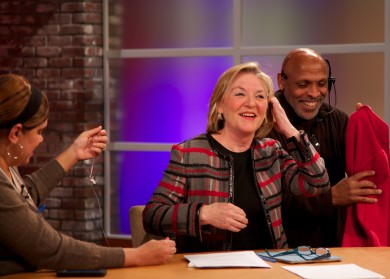Nice Above Fold - Page 394
Samuel Chamberlin Newbury, 'Mister Rogers' Neighborhood' producer, dies at 69
Samuel Chamberlin Newbury, who served as director of productions for Fred Rogers Co. for nearly three decades, died May 22 at his home in Pittsburgh of cancer. He was 69. Newbury is best remembered as the producer of Mister Rogers’ Neighborhood and as right-hand man of the show’s creator and namesake, Fred Rogers. He worked for Rogers’ production company Family Communications, Inc. (now known as Fred Rogers Co.) for 28 years from 1986 until his retirement in 2012. “He was incredibly smart, very creative, and Fred really liked to work with him because he was always prepared,” said Bill Isler, c.e.o.Tuesday roundup: FCC reveals spectrum auction details; Angelou doc goes forward
Plus: A TV quiz show hits its 40th year on the air, and Arthur gets a hip-hop treatment.PubTV doc Little League: A History celebrates 75 summers of iconic pastime
A public television documentary about Little League Baseball is turning into a fitting Independence Day scheduling choice for programmers.
Analysis finds flat core audience for public radio's web streams
A recent analysis of web metrics for NPR member stations’ websites showed continued growth in visits from mobile users along with declines in cumulative audiences and the amount of time web users spent with content. Though web metrics for public radio stations have grown dramatically since 2012, analytics from this spring were especially volatile, said Steve Mulder, director of user experience and analytics at NPR Digital Services, during a May 29 public radio metrics webinar with station representatives. Mulder drew analytics data from 204 stations that operate 415 web streams; together, their online platforms drew 14 million unique visitors and a cumulative audience of 3.3 million listeners from April 2013-14.Pubcasting programs spark anthology of 'Poetic Responses'
While public broadcasting covers poets and their work, a new anthology may be the first book of poems inspired by public media stories. Poet Robbi Nester of Lake Forest, Calif., edited The Liberal Media Made Me Do It: Poetic Responses to NPR & PBS Stories (Lummox Press), featuring works of 56 poets reacting to segments and programs aired by public stations. Nester answered a few questions by email. This exchange has been edited. Where did the idea for this book come from? I listen to public radio all the time when I am in the car and often when I am at home.Rooney drops WGBH host role, Castadio exits pubcasting, and other comings and goings in public media
After hosting WGBH’s Greater Boston for 18 years, Emily Rooney is scaling back her role to focus on the weekly Beat the Press program.
Friday roundup: Diplomatic showcase features PBS docs; WBUR gets $1M donation
Plus: Reading Rainbow hits its fundraising goal, and a call to boycott NPR.Downton Abbey creator calls PBS delay in season scheduling 'madness'
Downton Abbey creator Julian Fellowes has weighed in on PBS’s decision to delay airing the Masterpiece megahit for months after each season premieres in Britain. And as his countryfolk might say, he is cheesed off. “I want to have simultaneous transmission in America and Britain,” he tells the Telegraph of London. “The difficulty that we have is that people are discussing the series as it happens online before America’s seen it and on the internet we’re all in the same company. It’s madness.” Then he adds: “It’s what I’d like, but who cares what I think?” Scheduling Downton is a tricky subject for PBS.Wednesday roundup: Pubradio breaks True Detective news; DPTV covers policy conference
And we're still waiting on spectrum auction specifics.NPR cancels 'Tell Me More', cuts 28 staff positions
A mandate for a balanced budget and a drive to reduce its production commitments spurred NPR to cancel Tell Me More, one of the few remaining broadcast shows outside of its newsmagazines that the network produces itself. NPR will end the production as of Aug. 1 as part of a broader newsroom restructuring announced May 20. Twenty-eight jobs in its newsroom and library will be cut; eight of the positions are currently unfilled. Tell Me More, a weekdaily program featuring host Michel Martin and focusing on news topics related to people of color, now airs on 136 stations. The show had struggled to add enough stations since its 2007 launch to break even, said NPR Chief Content Officer Kinsey Wilson.This American Life opts for self-distribution, with PRX as pipeline to stations
The producers of public radio’s This American Life will take over distribution of their show starting July 1, using Public Radio Exchange to deliver the program to stations. TAL and Public Radio International, its distributor of 17 years, announced in March that they would part ways effective July 1. Under the agreement announced Wednesday, Chicago Public Media and Ira Glass will handle distribution and underwriting, while Marge Ostroushko will be responsible for marketing and station relations. Ostroushko handled those duties before PRI picked up the show in 1997. “We’re excited and proud to be partners now with PRX,” Glass said in a statement.Dorothy Peterson, CPB program officer, dies at 79
Peterson worked on several projects for CPB and the National Endowment for the Humanities and mentored younger CPB staffers.Tuesday roundup: Pubmedia inspires poetry volume; ESPN prez responds to Kirk's "whining"
• I think that I shall never see A poem lovely as Wait Wait … Don’t Tell Me! Granted, that’s probably not among the verses in The Liberal Media Made Me Do It!, a new collection of poems based on public broadcasting stories and shows. But the book does contain pubmedia-centric contributions from more than 50 poets who were inspired by Radiolab, Performance Today, A Prairie Home Companion and other fare. “For me, the greatest delight in receiving these pieces has been to recognize the stories I have heard on the radio, with the added dimension of another’s perception added in,” writes editor Robbi Nester.FCC denies stations' bid for looser underwriting language
A public radio licensee’s bid to boost underwriting revenue by skirting restrictions on credit language met with a flat rebuttal from the FCC May 15. The licensee of Phoenix’s KBAQ and KJZZ asked the Commission in March to approve a three-year “limited and controlled demonstration project” to relax limits on language in the stations’ underwriting credits. Maricopa County Community College District proposed allowing qualitative terms, such as “award-winning” and “experienced,” and information about sales, discounts and interest rates. Such wording is currently barred under FCC rules. Maricopa argued that the relaxed restrictions would help the stations increase underwriting income amid a challenging climate for public broadcasting funding.Friday roundup: Barzyk unveils pet project; Senate drops patent-reform bill
Plus: Sesame Street and the Great Society, and PRX looks at the technical side of distributing WFMT shows.
Featured Jobs




